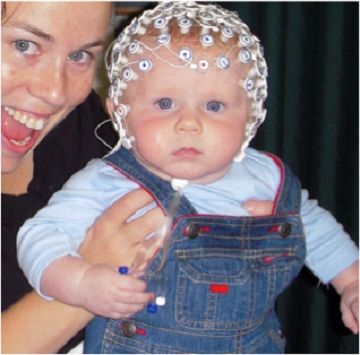Babies Spot Faces with Adult-Like Brain Power

Researchers say there's a reason babies fixate on faces. Even before they're good at distinguishing between basic shapes, babies young as 4 months old can process faces in an adult-like fashion, a new study found.
Using a net of sensors that gets placed over the scalp, researchers at Stanford's Vision and NeuroDevelopment Lab tracked the brain activity of infant and adult participants as they were shown different photographs.
For adults, faces and familiar objects alike prompted spikes in activity in the temporal lobe, a key region for higher-level visual processing. Researchers observed similar spikes for infants looking at faces, which indicated the babies were "not yet face experts like adults, but well on their way," said Faraz Farzin, a postdoctoral fellow at the lab, in a statement. But for infants looking at objects, the brain instead lit up in a part of the occipital lobe responsible for processing more low-level visual features, such as contrast or orientation, the researchers said.
The team, whose research was detailed online in the Journal of Vision, noted that it's unclear whether babies' early face recognition skills are intrinsic or if they arise from seeing lots of faces on a daily basis. And, as Stanford research professor Anthony Norcia explained, babies encounter faces and objects in a very different contexts.
"When you see a face, you're looking at your mom, you're interacting," Norcia said. "It's associated with a reward."
High-level face-processing might be added to a growing list of amazing infant brain abilities that have been discovered in recent years. For example, a 2010 study in the journal Neuron found that babies already use adult-like mental processes to discern a voice's emotional state by 7 months old. And a 2009 study in the journal Developmental Psychology showed that 6-month-olds could match the sounds of an angry snarl or friendly yap with photos of dogs showing the right body language.
Follow LiveScience on Twitter @livescience. We're also on Facebook & Google+.
Sign up for the Live Science daily newsletter now
Get the world’s most fascinating discoveries delivered straight to your inbox.












